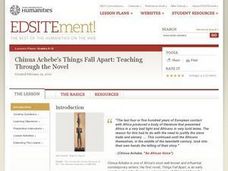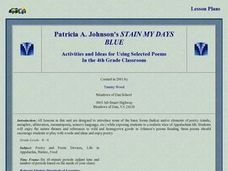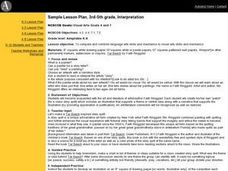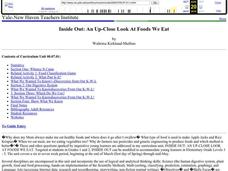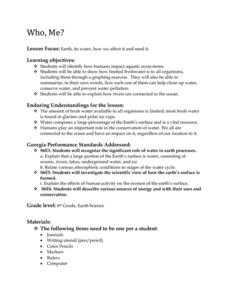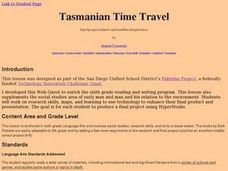Curated OER
Chinua Achebe's Things Fall Apart: Teaching Through the Novel
Students are introduced to Chinua Achebe's first novel and to his views on the role of the writer in his or her society. It can be used alone or in conjunction with the related lesson Chinua Achebe's Things Fall Apart.
Curated OER
Gullah Activities
Pupils study the Gullah culture by watching a video about Gullah, Gullah Island. They discuss the customs and crafts of the people such as basket weaving, food preparation, pottery, and quilt making. While working in centers, they make a...
Curated OER
Teaching Selected Poems from Jim Wayne Miller's the Brier Poems
Students explore the basic elements of poetry through Appalachian life poetry. For this poetry lesson, students read seven poems from Jim Wayne Miller's the Brier Poems and complete poetry analysis activities for each poem.
Curated OER
Trouble With Trolls
Young scholars listen to The Trouble With Trolls and discuss fables. In this story elements instructional activity, students work on reading skills. Young scholars participate in different reading activities.
Smithsonian Institution
For Land's Sake: George Washington as Land Surveyor
Students discuss the importance of land ownership and the purpose of land surveying in the eighteenth century. They interpret a transcript of an eighteenth-century land survey. They survey and area of land. They create a written or...
Curated OER
Mrs. Frisby and the Rats of NIMH
Fifth graders enjoy learning more about animals and their habitats as they explore the Internet sites in these Student Activities based on the main characters in Mrs. Frisbee and the Rats of NIMH.
Curated OER
MONSTERS AND MYTHS: SCRIPTS /SCULPTS
Seventh graders are introduced to myths formed by many cultures as a unique genre of literature. They use critical thinking skills to compare and contrast mythic tales, compare versions of the same story, and respond to literature in...
Curated OER
We're Environmentally Friendly
Fourth graders examine written works dealing with environmental issues and resolutions during a 5 week unit. They create posters, poems, and rap songs demonstrating authorship and knowledge of the environment.
Curated OER
CSAP Preparation: Don't Wait for the "Eleventh Hour"
Fifth graders participate in language arts activities designed to prepare them for taking standardized tests. The language arts format covers science and social studies content. Handouts and worksheets are included in the lesson.
Curated OER
Stain My Days Blue
Students read several poems related to the life and culture of the Appalachia region. They are introduced to the poetic forms of simile, alliteration and onomatopoeia and respond to the poems through journal entries and poetry of their own.
Curated OER
Sample Lesson Plan, 3rd-5th grade, Interpretation
Young scholars become acquainted with the art and literature of artist/author Faith Ringgold.
Curated OER
Out of the Dust
Students create a poem that expresses the physical and emotional turmoil of living through the Dust Bowl. For this Out of the Dust lesson, students research facts about the time period and discuss the cause-effect patterns...
Curated OER
Response to Literature: Anecdotal and Saga Memoir Poems
Students differentiate between anecdotal and saga memoir poems. In this response to literature lesson students analyze poems written by others then analyze incidents from their own lives to determine whether they meet the criteria for...
Curated OER
Famous Peacemakers ~ Creating a Declaration of Peace
Students read about famous peacemakers and identify their characteristics. They reseach a peacemaker they are interested in. They create a Declaration of Peace to share with the community.
Curated OER
Identifying Clouds
Students work in groups to research and prepare a report on cloud types. They present their findings to the class and take a group quiz competing for points. Students go outside and determine which type of clouds are visible on that day.
Curated OER
American Literature, The Earliest Days
Students prepare for and respond to literature selections. This package includes eleven lessons from the American Literature, The Earliest Days: Prehistory to 1750 each covering a different reading selection. Pre-reading and response...
Curated OER
I Am What I Think I Am!
Pupils study conative and cognitive strengths through characters in literature. For this conative and cognitive strength lesson, students read about a favorite character or historical person. They make a chart of the difficulties the...
Curated OER
Inside Out: An Up-Close Look At Foods We Eat
Fourth graders identify the origins of meats and vegetables consumed by humans on a daily basis. They classify foods (meats, dairy products, grains...) and create a food pyramid.
Curated OER
The Necklace Of Teeth Comic Strip
Pupils create a comic strip which identifies the major events in a story of the teacher's choosing in this upper-elementary classroom language arts instructional activity. The instructional activity is highly adaptable and can be used...
Curated OER
Who Me?
Students examine their place in society by looking closely at themselves as well as their role in their family and community. Students also examine the origin of the National Parks system and how it contributes to National Identity.
Curated OER
Memories
Fifth graders collect artifacts of their fifth grade school year and make a technology based Memory Book.
Curated OER
Tasmanian Time Travel
Sixth graders perform research using the Internet about the Tasmanian Devil. The project can be presented in a variety of ways. The use of computer software is important for students to know, specifically Hyperstudio.
Curated OER
Silent Spring
Students read background information about Rachel Carson found on the listed website links. They analyze and answer questions about her work and how it is linked to science then they research pesticide usage and alternative methods.
Curated OER
Cloud Databases
Students complete a unit on clouds and a report about one type of cloud. They collect data through observation about different types of cloud cover and then create a spreadsheet to reflect their observations over a 2 week period.
